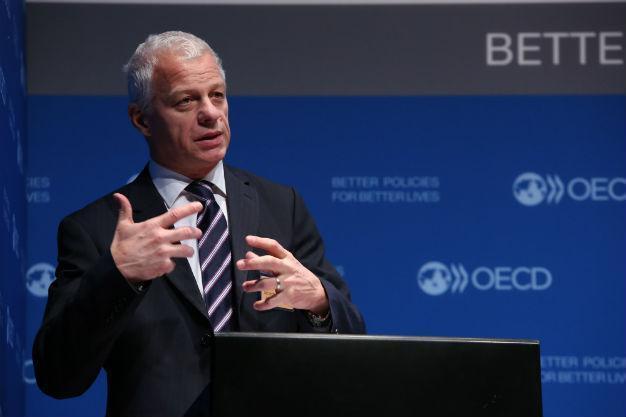Turkey’s economic development sets aside future problems: OECD chair
Öykü Altuntaş - Doğan News Agency
 Turkey’s economic development, which has been “looking quite good,” hampers the exposure of “real problems,” according to OECD Working Group on Bribery chair Drago Kos, who urged that the low level of transparency should be higher on the agenda.
Turkey’s economic development, which has been “looking quite good,” hampers the exposure of “real problems,” according to OECD Working Group on Bribery chair Drago Kos, who urged that the low level of transparency should be higher on the agenda.“Transparency is the tool that usually helps control what the state powers, especially what the executive branch is doing. However, an extremely low level of transparency is a problem in Turkey,” Kos told Doğan News Agency, on the sidelines of a Transparency International Turkey panel on April 7.
According to the 2015 Corruption Perception Index (CPI) by Transparency International, Turkey declined by three points from 45 to 42, as was also seen in 2014, and fell by two points in its ranking to 66th among the 168 participating countries.
However, Turkey’s economic development has been an asset comparable to many other countries, although it was “slowing down” and “not as vivid as it was before,” Kos added.
According to Kos, this upsurge also stirs questions about the transparency of other issues.
Economic development ‘gives the impression that everything is fine’
“This is the reason why many other problems of Turkey are not being exposed to such an extent. The problem of corruption could be much higher on the agenda, not only for the civil society and the public sector, but also the government itself,” he said.
“If it is not, there will be economic development which gives the impression that everything is fine, which it is not,” he said.
According to the OECD group chief, “real problems could pop up when this level of development slows down and people start to realize the problems.”
“Not one, not two, but several problems will erupt at once, and the government will have to deal with all of them,” Kos stressed.
Still, Turkey was a “very good example,” Kos said, adding, “Many countries would like to reach at least the approximate level of economic development in Turkey.”
Kos also said Turkey was doing fine in this area, however highlighting the problem was “the government pushing aside other things which will be very problematic in the future” because of this economic development.
‘Shocked’ by ‘suppression of media’
Kos added he was “shocked to see how much the media freedom has been suppressed in Turkey.”
Turkey has been exposed to different threats while it is developing in several areas, Kos said.
“If citizens and state institutions in Turkey do not have the real picture of what is going on, they might easily be defrauded with wrong information,” Kos said.
Kos underscored that free press was the first step “to a better society where all citizens can take part in governing the country.”
‘No Turkey in EU without free media’
Kos also spoke about how these concerns influenced the perception of Turkey in the eyes of the OECD and the European Union amid reenergized accession talks.
“I can say that media freedom is one of the crucial elements when union members decide if Turkey should be invited to the join the EU or not,” said Kos, adding that the OECD’s focus was wider than press freedom.
However, “without the freedom of the media, I do not see any countries joining the EU, including Turkey,” he added.
The authority of the government over other institutions, especially due to “moves to politicize the judicial system,” along with a number of bans and limitations on the freedom of the media, have “eroded checks and balances on the political authority,” according to Transparency International Turkey’s “National Integrity System Assessment – Turkey” report, which was released on April 7.
















